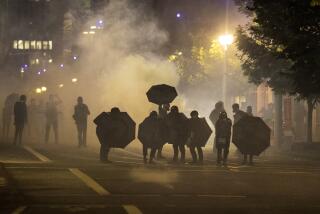‘Nonlethal’ Weapons Vital, Panel Says
WASHINGTON — A panel of the National Research Council called Monday for more study by the military of “nonlethal” chemicals that might control crowds or hostile people -- a particularly sensitive subject after Russian forces took as many as 118 lives last month by using a gas to end a hostage standoff in a Moscow theater.
The panel’s recommendation was part of a broad endorsement of the idea that military commanders need a wide range of nonlethal weapons on hand because they are being called on to serve in more situations short of outright war.
In 1996, the Pentagon started a small but formal effort to study new types of rubber bullets, underwater systems to protect ships, energy beams to stop vehicles and other technologies that might incapacitate people or machinery without causing death.
The goal was to better respond to hostile civilians during peacekeeping missions, humanitarian efforts and other such situations.
In addition, the Pentagon saw a role for nonlethal weapons in defending ships and buildings, especially when there is little time to determine whether an oncoming vehicle is friendly or carrying explosives.
“Terrorists often put themselves in the middle of noncombatants -- so how do you deal with that?” asked Miriam E. John, a senior administrator at Sandia National Laboratories and chairwoman of the committee that wrote the report.
“You can’t go in and blow it to pieces. You have to have some options to neutralize folks, so you can then sort out the bad guys from the good guys,” she added.
Nonlethal weapons, John said, “should be a more integral part of war-fighting capabilities.”
The Navy office that requested the report had no comment Monday.
The National Research Council is part of the National Academies of Science, a congressionally chartered organization that advises the federal government on science and technology.
The National Research Council panel that wrote the report recommended that the Navy “invest in a richer portfolio” of research in several areas, including chemical agents.
Chemical agents are the most controversial area of nonlethal technology, largely because their use is sharply limited by an international treaty called the Chemical Weapons Convention.
The treaty bars the use of any chemical agents -- even tear gas -- in warfare, but allows their use for law enforcement and riot control.
Some critics have accused the United States and other nations of developing chemical weapons for war under the guise of law enforcement. Pentagon spokesmen have said they are conducting no research on nonlethal chemical compounds.
The National Research Council panel said that nonlethal chemicals have “compelling applications in engine stopping and crowd control that cannot be achieved by other means.”
It recommended that the Navy boost its research into “calmative” agents and foul-smelling “malodorants,” including more study of their effect on the human body and behavior. It also called for research into ways to disperse the chemicals.
The panel said that no work should proceed that violates the Chemical Weapons Convention. But John also said it was difficult to know what work was allowed or barred by the treaty.
“We said that depending on who you talked to, you can get any interpretation of the treaty that you wanted,” John said.
She said the Pentagon should issue a clear interpretation.
The report comes just over a week after Russian forces used a gas, identified as a version of the opiate fentanyl, to end a hostage standoff with Chechen guerrillas in a Moscow theater. About 120 of the 750 captives died, nearly all of them from the gas’ effects.
Edward Hammond of the Sunshine Project, which has been trying to obtain and publicize documents related to U.S. chemical agent research, said the panel’s report was “a body blow to global chemical weapons control.”
“The panel’s findings will be used by the Pentagon to redouble their chemical weapons development efforts, with potentially disastrous results for arms control,” he said. “Other countries will follow suit, and controls on chemical weapons could quickly destabilize.”
Mark Wheelis, a professor of microbiology at UC Davis who has written widely on chemical and biological weapon controls, said research on nonlethal chemicals would “erode the norms against using chemicals as a weapon.”
He said the same manufacturing equipment and delivery systems for nonlethal chemicals can be used for lethal agents.
“We would make it far more difficult to figure out if other nations have lethal chemical weapons or not,” he said. “It’s much easier to hide a lethal chemical weapons program if you have a nonlethal program.”
More to Read
Sign up for Essential California
The most important California stories and recommendations in your inbox every morning.
You may occasionally receive promotional content from the Los Angeles Times.










